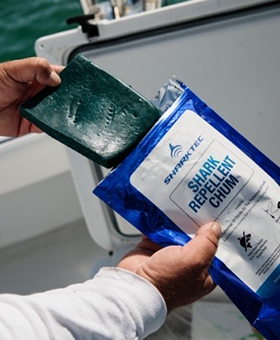The Science Behind SharkTec's Shark Repellent Sprays
HOW A SHARK HUNTS:
Sharks have an amazing sense of smell (most sharks can detect blood and animal odors from many miles away) which is one of the reasons they are such effective predators. In addition to smell, sharks also rely on their sense of taste. Typically before a shark commits to its prey it will first give a "test bite". The shark has very sensitive taste buds in its mouth which can quickly decipher whether the potential meal is within its ordinary diet; in the case of humans the shark will often reject this prey after the first bite.
GAME-CHANGING DISCOVERY:
In nature, deceased sharks emit a natural defense mechanism to warn other sharks in the vicinity of potential danger. When a shark smells decaying shark tissue its natural fight-or-flight response kicks in and the shark will avoid that area for fear of further danger. Using what is called Semiochemicals derived from decomposed sharks, SharkTec is able to offer a natural product which triggers an immediate flight reaction in sharks.
Essentially living sharks will instinctively stay far-far away from the area where they can smell and taste another dead shark!
PROVEN, TESTED RESULTS:
The theory of repelling living sharks by using semiochemicals as shark repellents was proposed by Baldridge (1990) and by Rasmussen and Schmidt in 1992. In 2001, investigation of these possibilities led Eric M. Stroud (SharkTec’s partner) to begin qualitative analysis on semiochemical extractions using captive juvenile sharks. In 2003, with the help of Dr. Samuel Gruber, Grant Johnson, and the Bimini Biological Field Station, the team was able to document a number of successful field tests on wild feeding sharks. The results of these field tests were first presented at the 2004 Joint Meeting of Ichthyologists and Herpetologists 26 – 31 May, 2004, in Norman, OK. Since then the product has continued to return compelling results and has been feature on well known publications such as Discovery Channel.



